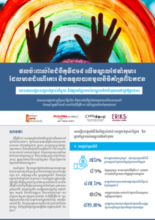Demographic Data
|
Sources: World Bank, UNDP, UNAIDS, DHS 2013 |
Displaying 2961 - 2970 of 14390
Lumos worked together with partners on the family-based care for unaccompanied children project between 2018 and 2020, in four camps in the Tigray region of Ethiopia. This evaluation report considers the various components of the project and provides recommendations to child protection and refugee response practitioners, with the aim of improving the quality of child protection programming and its impact on unaccompanied children in refugee contexts.
Drawing from a review of global reports and case studies, as well as from information sourced from Global Social Service Workforce Alliance members, this report explores the key challenges social service organizations and workers have faced since the beginning of the pandemic and showcases how they have been able to adapt and innovate in response to such challenges.
Este resumen para niños y jóvenes acompaña al informe "Hagamos que nuestras voces cuenten: las respuestas de los niños y los jóvenes a una encuesta mundial para el Día de debate general de 2021 sobre los derechos del niño y los cuidados alternativos".
For decades, First Nations have called for Canada to respect the sacredness of their children and youth by upholding the best interests of the child, substantive equality and cultural continuity. This call has been echoed in numerous reports including, but not limited to, the Royal Commission on Aboriginal Peoples (1996), the Joint National Policy Review (2000), the Wen: De Reports (2005), the Truth and Reconciliation Commission (2005), A Roadmap to the Truth and Reconciliation Commission Call to Action #66 (2018) and the National Inquiry into Missing and Murdered Indigenous Women and Girls (2019). In June 2020, Bill S-217 (now S-210) was introduced by Senator Rosemary Moodie for the creation of an Office of the Commissioner for Children and Youth in Canada. The Bill proposes the establishment of an appointed Commissioner for Children and Youth to promote, monitor and report on
the implementation of Canada’s obligations under the United Nations Convention on the Rights of the Child.
This child and youth friendly summary accompanies the report "Make Our Voices Count: Children and Young People's Responses to a Global Survey for the 2021 Day of General Discussion on Children's Rights and Alternative Care".
This report was commissioned by a group of civil society organizations (CSOs) in an effort to get a broad sense of what children and young people themselves think about their experiences in alternative care.
This study was a small-scale piece of qualitative research that involved 21 semistructured interviews with founders, funders, and directors of RCIs across 7 countries. It was designed to better understand the impacts of COVID-19 on the operations of residential care institutions including funding, staffing, volunteering, children’s care, education, family connection and reintegration.
The goals of Catholic Care for Children in Uganda (CCCU) are to enable children to grow up in safe environments, reduce recourse to institutional care, and encourage family- and community-based care for children. This midterm evaluation examines what has been accomplished in the four years since the program began.
This briefing paper draws on data and findings from the report: Impact of COVID-19 on Privately Run Residential Care Institutions: Insights and Implications for Advocacy and Awareness Raising.










